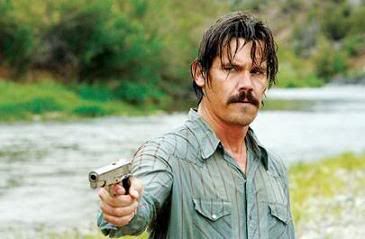
"What's this guy supposed to be, the ultimate badass?"
It's almost the end of November and I think I've finally found myself the best movie of 2007. While there is still a month to go and plenty of Oscar-fare left to see, I doubt anything can top No Country for Old Men. It may not have the soul-stirring edginess of Gone, Baby, Gone or the action-packed slickness of 3:10 to Yuma but it does have two things no other film has this year: Joel and Ethan Coen.
The Coen brothers have kicked out some of the quirkiest cinematic gems of the past 20 years, but after two critical and box-office flops (Intolerable Cruelty and The Lady Killers) in the last few years, I began to wonder if the creative pool was drying out. Perhaps that's the reason I was so enamored with No Country. It proved my theory wrong and with a vengeance. Like Fargo, The Big Lebowski, and O Brother, No Country is a world more than it is a film. While the movie is not based on an original screenplay (it was adapted from Cormac McCarthy's novel of the same name) you can't help but feel as though this story was written solely for the purpose of becoming a Coen brothers film some day. From the sound design and cinematography to the wardrobe and locations, every element of the film plays a key part in bringing this fictional world to life. Some people reduce the Coens' success to their skills as writers and the talented people they cast in their films. However, it is so important to realize how brilliant they are as filmmakers. Only a true visionary can take a simple story and turn it into something palpable.
Now I couldn't write a review of No Country without calling attention to the cast. Every actor in this film, whether in a bit part or a starring role, is fantastic. I give Joel and Ethan Coen mad props for making some rather unconventional choices in the casting decision. Here's a quote from an interview Entertainment Weekly did with Javier Bardem that illustrates precisely what I mean:
"When the Coens called, I said, 'Listen, I'm the wrong actor. I don't drive, I speak bad English, and I hate violence.' They laughed and said, 'Maybe that's why we called you.'"
The Coen brothers have a great knack for knowing when an actor will absolutely nail a character and their decision to cast Javier Bardem as Anton Chigurh is no exception. Chigurh is one of the strangest and most haunting individuals in recent cinematic history and much of that is because his appearance is so off-putting. He doesn't look or sound anything like your typical psycho-killer and I give a lot of credit to both the Coens and Bardem for putting so much thought into the portrayal of Chigurh. Bardem gives the character this sort of soft-spoken madness that is extremely scary to watch yet at the same time totally fascinating.
I also love that they cast Josh Brolin as the protagonist, Llewelyn Moss. This seems to be Josh Brolin's year (he's had starring roles in Grindhouse and American Gangster) but before 2007 he was pretty much the guy that was hired for the bit role because he was cheap. Brolin is not a critically acclaimed actor nor does he have box-office appeal. The Coens really took a chance giving him such an important role and I think it paid off beautifully. Brolin has a fantastic every-man quality and as Llewelyn Moss, he reminded me a lot of the great leading men of '60s and '70s Westerns.
Tommy Lee Jones is flawless as Sheriff Ed Tom Bell which shouldn't surprise anyone. What I really loved about his character was how similar it felt to Frances McDormand's Marge Gunderson in Fargo. Sheriff Bell is the glimmer of hope amongst all the bloody chaos and nihilism, and while the film doesn't make any attempt to provide resolution or closure, he is the one element that allows you to walk away feeling slightly optimistic. I attribute that not only to the greatness of the character as it was written but also to the warmth and compassion Tommy Lee Jones brings to the role.
I don't think there's anything left to say other than that everyone should see this movie as soon as is humanly possible. Yes, ticket prices are indeed ridiculous and you probably feel like you should be spending your hard earned dough on blockbusters rather than indie fare. However, I still encourage you to see No Country for Old Men in the theater because crappy popcorn movies will always be playing on the big screen but a classic Coen brothers film will not.

